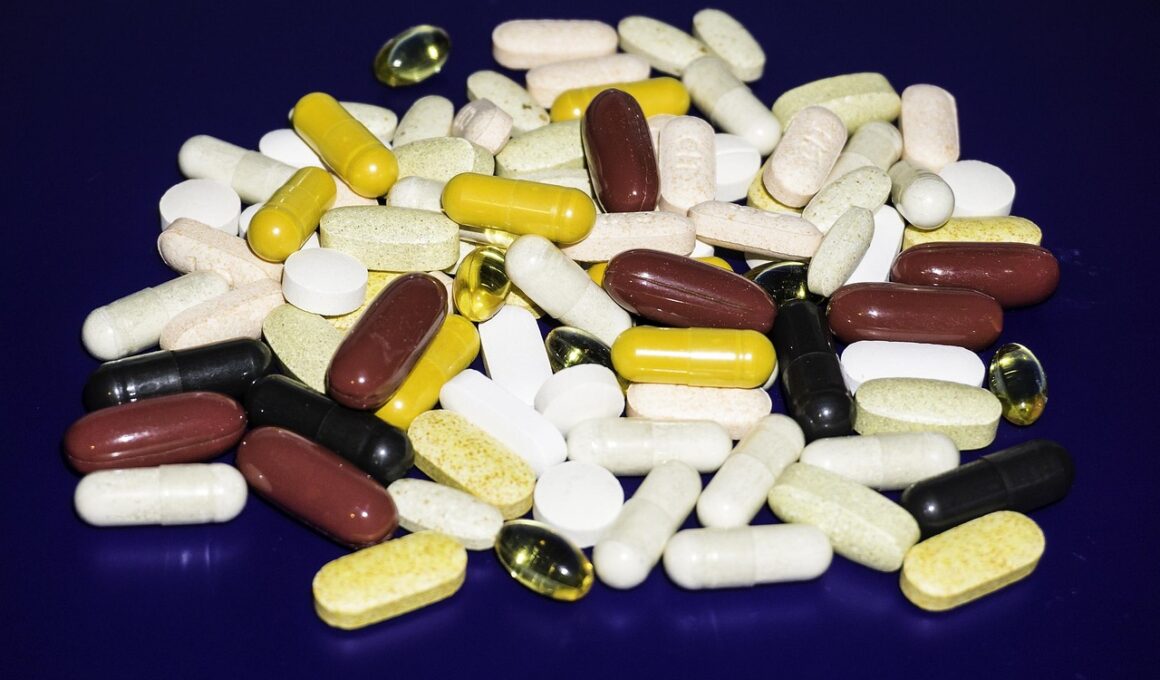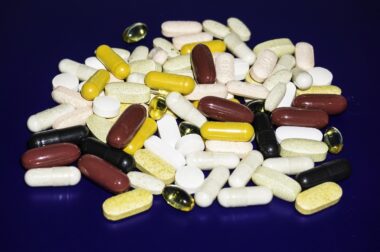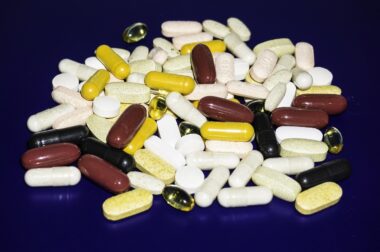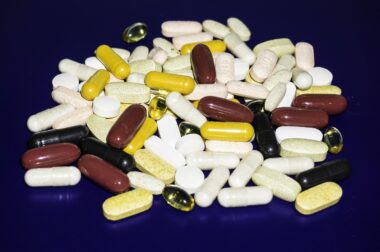Essential Vitamins and Minerals for Athletes
For athletes, proper nutrition is essential not just for performance but also for overall health and recovery. Among the key nutritional components are vitamins and minerals, which are crucial for energy metabolism, muscle contraction, and recovery. Micronutrients play a vital role in enhancing physical performance, preventing injuries, and reducing fatigue. Athletes who engage in intense training regimens are at risk of micronutrient deficiencies, which can hinder their athletic performance if not adequately addressed. A balanced intake of these nutrients often helps improve muscle function and supports optimal metabolic processes. For effective training, athletes must include appropriate sources of vitamins and minerals in their diets, such as fruits, vegetables, whole grains, and lean proteins. Supplements may also be beneficial to achieve adequate intake levels due to the high demands of athletic activities. Therefore, understanding the types and benefits of essential vitamins can make a significant difference in an athlete’s training regimen. Ultimately, having the right micronutrients can optimize performance, support recovery, and enhance overall health for athletes at all levels.
Some essential vitamins and minerals for athletes include Vitamin D, Calcium, Iron, and Magnesium. Vitamin D is crucial for bone and immune health during training. Calcium works alongside Vitamin D to support muscle contraction and bone density, thus preventing injuries. Iron, on the other hand, is essential for oxygen transport in the blood and is vital for endurance and stamina. Athletes, especially those participating in endurance sports, require sufficient iron to maintain energy levels. Lastly, Magnesium contributes to energy production and muscle function while also being important for recovery after strenuous exercise. The optimal levels of these vitamins and minerals can be achieved through a varied diet or supplemented as necessary, taking care to assess individual needs. Consulting with a healthcare professional or registered dietitian ensures that athletes tailor their nutrition and supplementation to meet their specific requirements. These practices help sustain performance and alleviate the risks associated with deficiencies. Supplemental formulations can vary, so athletes should seek high-quality options to best meet their nutritional goals.
Water-soluble vitamins like B vitamins also play a significant role in energy production for athletes. B vitamins, specifically B6, B12, Niacin, Riboflavin, and Folate, are involved in metabolic processes which convert carbohydrates into energy. Adequate B vitamin intake enhances muscle growth, endurance, and recovery. Furthermore, antioxidants such as Vitamin C and E can help combat oxidative stress during intense exercises. This oxidative stress can lead to muscle fatigue and damage, making antioxidant-rich foods and supplements essential for athletes. The combination of these B vitamins and antioxidants strengthens the cellular processes crucial for performance. Therefore, athletes should be mindful of their B vitamin levels and consider including whole grain cereals like brown rice and oats in their meals. Additionally, fruits such as bananas and oranges provide both B vitamins and antioxidants while also promoting hydration. Maintaining a diet rich in these important vitamins fosters stamina and accelerates recovery, greatly benefiting athletic performance. Athletes might especially consider monitoring their B vitamin intake during training and competition to ensure they achieve their best outcomes.
Main Sources of Vitamins for Athletes
To effectively meet their vitamin needs, athletes should emphasize whole foods rich in vital nutrients. Fruits and vegetables are natural sources abundant in vitamins and should form the basis of an athlete’s diet. Leafy greens, for example, are excellent sources of Vitamin K, Calcium, and Iron. Spinach, kale, and broccoli are great options, as they also provide fiber to aid digestion. Whole grains like quinoa, oats, and barley boost energy levels while offering B vitamins and fiber. Lean protein sources, such as chicken, turkey, and fish, provide essential amino acids along with important micronutrients, contributing effectively to muscle recovery. Nuts and seeds are power-packed with healthy fats and minerals that promote overall health. Additionally, dairy products like yogurt and milk offer Calcium and Vitamin D necessary for bone strength, especially in high-impact sports. When athletes cannot meet their dietary requirements through food sources alone, they might opt for supplements. These can serve as an addition to fill gaps in nutrition but should not replace balanced meals.
Despite the potential benefits of supplementation, athletes should approach vitamin and mineral supplements with caution. Over-supplementation can lead to adverse effects, making it crucial to identify individual needs based on dietary habits and lifestyle. It’s advisable for athletes to seek professional guidance before starting any supplementation regimen. A thorough assessment of their current diet can help determine what nutrients are lacking or adequately met. Timing is also important; certain vitamins might be best consumed at specific times relative to workouts or post-exercise recovery. For instance, taking Vitamin D in conjunction with a meal that includes healthy fats can enhance absorption. Similarly, consuming B vitamins pre-workout may enhance energy levels during physical activity. Athletes can benefit from keeping track of their nutrient intake, which can help adjust dietary approaches effectively over time. However, relying solely on supplements is not recommended. Whole foods should be the primary source of vitamins and minerals, maintaining a balanced diet that fuels performance, recovery, and overall health effectively.
Final Thoughts on Nutrient Needs
In conclusion, understanding the essential vitamins and minerals for athletes is key to optimizing performance and recovery. A well-rounded diet rich in nutrients is indispensable for meeting the energy demands and maintaining health within active lifestyles. Athletes should prioritize whole foods, rich in necessary vitamins and minerals, while considering supplementation to fill specific gaps. Regularly monitoring nutrient intake can help preserve optimum performance and promote recovery from strenuous training. By taking a proactive approach to nutrition, athletes can ensure they remain at the top of their game, combat fatigue, and reduce the risk of injury. The importance of adequate hydration and micronutrient intake cannot be overstated. Thus, athletes are encouraged to educate themselves and seek guidance when needed. Proper nutrition simply complements consistent physical training and the effort placed into improving skills and fitness levels. With the right supportive nutrients, athletes can achieve performance goals effectively, sustaining their physical and mental health over time. Ensuring correct vitamin and mineral consumption enhances energy production, muscle function, and overall wellness significantly.
Ultimately, each athlete’s nutrient requirements may differ based on various factors, including the type of sport and training intensity. Therefore, there is no one-size-fits-all approach to nutrition for athletes. Recognizing individual needs through a personalized nutrition plan can significantly impact performance outcomes. Regular assessments and adjustments drive optimal results while facilitating recovery from physical exertion. Therefore, athletes should remain attentive to their dietary choices and be mindful of how these choices align with their performance goals. Collaborating with nutrition professionals, including dietitians, can guide athletes toward efficient nutrition strategies. Supplements can be integrated safely while retaining commitment to healthy eating habits. This combination allows athletes to harness their fullest potential. As modern research continues to evolve in sports nutrition, staying informed about the latest recommendations will position athletes for success in their pursuits. Embracing a holistic approach towards diet, incorporating both whole foods and supplementation judiciously, ultimately creates a sustainable framework for enhancing athletic performance. By prioritizing proper nutrition, athletes pave the way toward achieving their goals.
To summarize, a focus on essential vitamins and minerals empowers athletes to reach and maintain peak performance. A well-rounded diet combined with prudent supplementation ensures that the body has the necessary tools for optimal functioning. By embracing techniques to improve their nutritional strategies, athletes should experience benefits that translate to their training, performance, and recovery. Emphasizing the significance of a balanced intake of vitamins and minerals is paramount for athletes striving for excellence. This knowledge allows athletes to navigate their nutrition effectively and make informed dietary choices. As sports science progresses, athletes can leverage this knowledge for competitive advantage, supporting their physical endeavors and wellbeing long-term. Monitoring and optimizing micronutrient intake is a journey that athletes can actively engage in, improving both their performance and enjoyment of the sport. Athletes must acknowledge that consistent nutrition will reflect positively not only on their training but also on their overall health. Creating a nutritional blueprint that incorporates the essential vitamins and minerals will ultimately lead to enhanced performance, greater resilience, and better recovery. This comprehensive approach fosters an environment where athletes thrive and flourish in their athletic pursuits.





